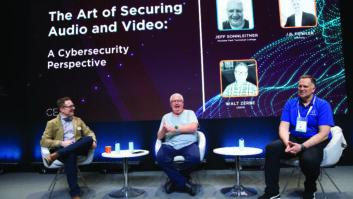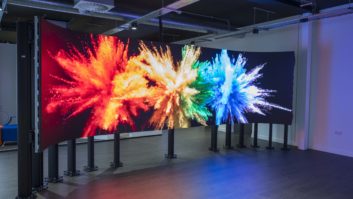Nearly half of enterprises (44%) are collecting data on employees’ home working hours, with an additional 33% planning to do so in future, according to new data from Kinly,
The company’s Trusted Connections 2024 study surveyed 425 enterprise AV professionals working in the UK, Germany, Nordics, and the Netherlands. It revealed that 65% of enterprises are encouraging staff to install Internet of Things (IoT) devices into their homes, while a third (33%) are also investing in analytics platforms to monitor remote workers.
It appears that at-home tracking systems are helping meet employer obligations to protect employee wellbeing. A third of those surveyed (32%) said their organisations are now collecting wellbeing data such as ‘tiredness indicators’ from remote staff. A further 37% plan to track this sort of data in future.
More than a quarter (28%) said their organisations are also collecting environmental data from homes – such as lighting and air quality, while 36% have plans to collect this data in the future.
 “For years enterprises have been able to maximise both the productivity and wellbeing of staff within the office environment,” said Tom Martin, CEO of Kinly. “From providing natural lighting, to monitoring screen time, worker analytics have been a big part of the AV industry. Now, that’s all changing. With so many employees working from home, businesses can no longer guarantee a high-quality work environment. The result is people working longer hours, in conditions that wouldn’t have been acceptable at the office.
“For years enterprises have been able to maximise both the productivity and wellbeing of staff within the office environment,” said Tom Martin, CEO of Kinly. “From providing natural lighting, to monitoring screen time, worker analytics have been a big part of the AV industry. Now, that’s all changing. With so many employees working from home, businesses can no longer guarantee a high-quality work environment. The result is people working longer hours, in conditions that wouldn’t have been acceptable at the office.
“IoT technology is becoming an increasingly popular way to address this, using at-home AV equipment to monitor everything from air quality, to working hours and screen time. Of course, adopting this tech means being transparent with employees. It cannot be used without their express consent.”
According to Kinly’s research, employee wellbeing is not the only challenge posed by the rise of hybrid working. More than half of those surveyed (57%) said poor hybrid workflows are damaging staff productivity, while 27% face issues with decentralised or siloed data. Fifty-eight percent said that outdated AV tech is also damaging the overall productivity of remote employees.
“While remote worker tracking will definitely be the hot topic of 2024, there’s a lot to be said about getting the basics of AV right,” added Martin. “Many enterprises have still not developed effective strategies for hybrid working, with efficiency and productivity slumping due to badly designed workflows and outdated tech. As our research report shows, effective hybrid working is essential to business growth, staff retention and even recruitment. Simply giving employees a laptop and saying ‘work from home’ isn’t enough. Enterprises need bespoke, intelligent, and increasingly data-driven solutions for hybrid working, built around their specific business goals, and their employee’s individual needs.”
The full report is available here.







